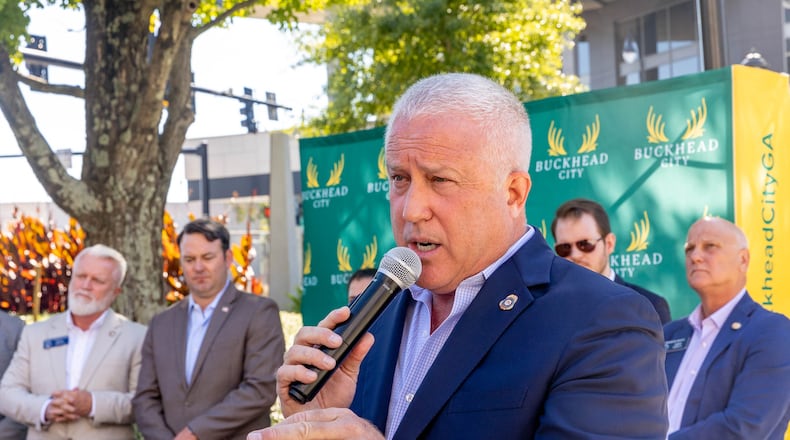I first met Bill White last August under the money tree at Buckhead’s OK Café. Where else?
Even in a city used to high fliers, big talkers and publicity hounds, White had given Old Atlanta a run for its money by building momentum, seemingly overnight, to carve the wealthiest and whitest portion of Atlanta away to become a separate city of its own.
Violent crime was newly up and Atlanta Mayor Keisha Lance Bottoms had made little mention of Buckhead or much else in her waning days in office. Into the void swooped White with promises of safer streets and a leader ready to pay attention.
Because Georgia already had a city named Buckhead, the Atlanta version would have to be called the “City of Buckhead City.” But redundancies and precedent be damned, the idea was put in motion.
But now, even with a GOP-election year Legislature primed to say yes and Atlanta Mayor Andre Dickens barely five weeks into his job, White’s gold-plated promise of a Buckhead City is dead for the year.
Outgoing Lt. Gov. Geoff Duncan announced his opposition to the idea last week and House Speaker David Ralston said, in this case, he won’t intervene.
An autopsy for Buckhead City’s demise would point to three causes of death, and two of them are people —Mayor Dickens and Bill White himself.
The fatal blow has been the failure of the Buckhead backers to answer, or even address, the biggest questions the proposed split spawned in the year since it was first introduced.
But the first rule at the Georgia Capitol is that all politics are personal and it’s hard to think of two men with less in common than Andre Dickens and Bill White, except possibly White, an audacious New York transplant, and House Speaker David Ralston, the more modest Republican from Blue Ridge.
Knowing that the Speaker would be the most powerful vote on the decision to allow a cityhood referendum in 2022, Dickens picked up the phone the morning after he won election to tell Ralston he hoped they could work together for both of their shared interests.
The call was followed by in-person visits, not just to the Speaker, but also to Duncan and Gov. Brian Kemp on their own Capitol turf. It was no coincidence that the mayor got a standing ovation when he visited the General Assembly in January. He had done the early work before he arrived.
White, on the other hand, frequently sent his messages through lobbyists, Fox News appearances and bombastic social media posts.
Days after Dickens was sworn in, he called the mayor a “DISASTER IN THE MAKING.”
On Jan. 6, he tweeted “Buckhead City is 100% virtually a guarantee!”
As the Legislature got underway for the session, simpler cityhood bills in Cobb County began to move quickly, as expected. Not only were they supported by the lawmakers who represent their areas, they were far simpler than Buckhead’s, with no pre-existing bond debt to divide up or city schools and property to litigate.
Dickens continued to reach out to rank-and-file lawmakers without fanfare, including the Republicans leading the Buckhead effort.
He also started to address the underlying issue of crime in Buckhead itself. He announced a new police precinct in the heart of the business district and partnered with Cousins Properties, one of the city’s most prominent real estate developers to do it.
While Dickens continued his charm offensive at the Capitol, White was becoming merely offensive. After one meeting in the Capitol, a Republican told me, “The meeting began with Bill telling us how great he is, followed by Bill waiting for us to tell him how great he is.”
White attacked Buckhead’s Democratic lawmakers, who oppose cityhood, on Twitter. He had also raised eyebrows when he retweeted, then quickly deleted, a post from a white nationalist organization about crime in majority-Black cities.
But it was an Instagram post last week, wrongly connecting the death of MARTA’s former CEO to $200 million of money “missing” from MARTA coffers, which was never missing at all, that offended even White’s staunchest supporters in the Capitol.
If he was willing to malign a dead man with no evidence, what wouldn’t he do?
Above and beyond the personalities at play, the pro-Buckhead City group never began to answer the thorny issues their idea generated.
At my first meeting with White six months ago, I asked where Buckhead kids would go to school in the event of a split. I still don’t know.
Others asked what the start-up costs of the new city would be? No specific answers came forward. What would happen to the city’s bond rating? Who knows? How would crime in Buckhead change when the criminals and the prosecutors would remain the same? Don’t ask.
People familiar with the pro-cityhood group’s legislative strategy readily admit that the legislation to create the “City of Buckhead City” was a cut-and-paste job from past cityhood movements. Different, more detailed language will be in a substitute bill to be unveiled at any future hearings. The answers are all ahead, we’re assured.
White and the Buckhead City Committee are holding a “major announcement” about the future of the effort and its leadership on Wednesday and White has said the City of Buckhead City effort “will NEVER go away.”
If that’s really the case, it seems destined to become Atlanta’s newest lost cause.
But the roller coaster, up-and-down, personality-driven mayhem of the past year may have inadvertently put to rest the one question underlying the entire debate: Would breaking Atlanta apart be worth everything it would cost to make Buckhead City happen?
On that question alone, the Buckhead City group has finally provided an obvious answer.
About the Author
Keep Reading
The Latest
Featured



